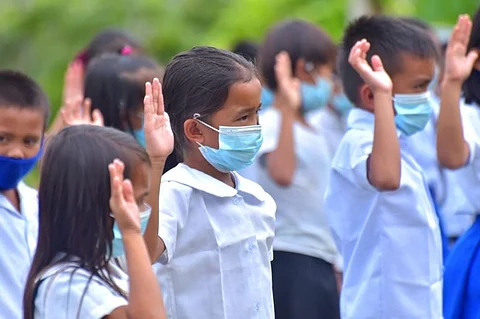

AN OFFICIAL from the Department of Education-Davao Region (DepEd-Davao) said that there were no orders for students to wear masks in relation to the increasing cases of pertussis or whooping cough in the region.
Jenelieto "Dodong" Atillo, spokesperson of DepEd-Davao, revealed this on Thursday, April 4, 2024, at the Media Center, DepEd Division Office.
However, he that the agency is encouraging parents to use their “wise discretion” on their children wearing masks.
“We encourage the parents to use their wise discretion. We would rather that they order their children to wear masks for protection,” he said.
The department is also monitoring the health status of the Davao Region Athletic Association (Davraa) 2024 athletes amid the threat of pertussis. Reynante Solitario, DepEd-Davao City Schools Division Superintendent, said that the medical teams assigned to their billeting quarters monitor the athletes.
According to Solitario, they offer consultations to athletes to ensure their well-being at all times, whether they are at the games or in their own billeting quarters.
Athletes who show signs or symptoms of pertussis will be closely monitored until all delegations return home on April 7, 2024.
Meanwhile, the City Health Office (CHO) confirmed that they have already recorded two cases of pertussis in Davao City.
Dr. Julinda Acosta, head of the CHO technical division, said the first case is a four-month-old infant from Agdao, and the second case is a three-month-old infant from Barangay 9-A.
However, Dr. Delta S. Aguilar, Southern Philippines Medical Center (SPMC) Head of Infectious Disease Cluster for Reemerging Diseases of the Department of Pediatrics of SPMC, said that the SPMC has already recorded 10 pertussis cases for the first quarter of this year alone.
When asked about the disparity in their data, Acosta clarified that Davao City is not the source of all 10 of the pertussis cases reported by the SPMC. According to her, several of the individuals listed are from outside Davao City and were only recently diagnosed with the illness in the hospital.
Pertussis is a vaccine-preventable disease if the child has been administered with the Pentavalent (Diptheria, Pertussis, Tetanus, Hib, HupB) vaccine.
As early as six weeks old, infants can receive a free pertussis vaccination at any government health clinic. Children ages one to six may receive a booster dosage. Adults and older children should see a physician or other healthcare provider for advice on appropriate vaccination schedules. Additionally, expecting mothers might ask about immunizations, which can shield their unborn child from the illness.
In addition to receiving vaccinations, SPMC and CHO emphasized the need to maintain good hygiene, which includes proper hand washing, covering mouth and nose when coughing or sneezing, getting enough sleep, and drinking lots of water. These measures are crucial in preventing the disease from spreading. RGP
Related stories: